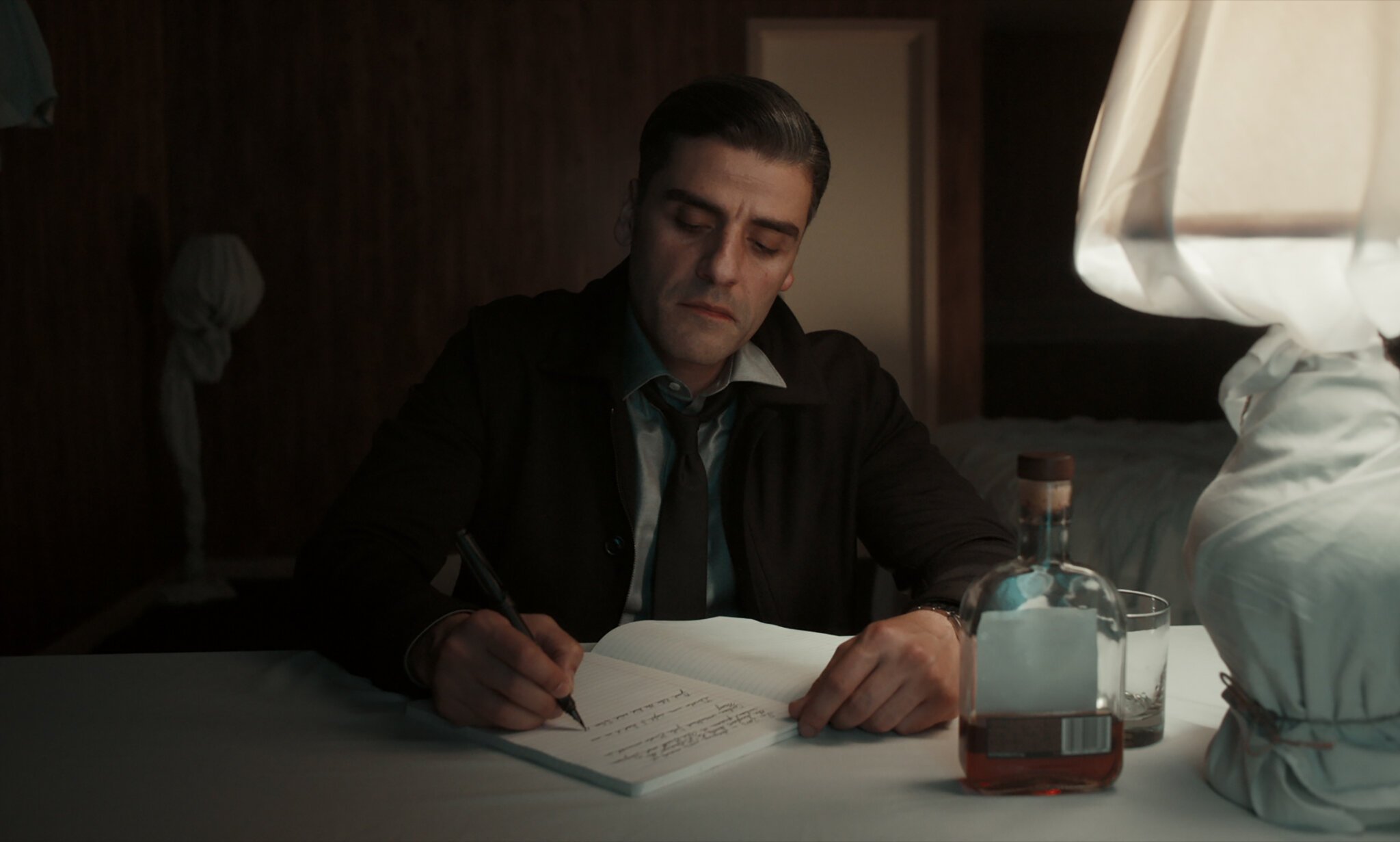Paul Schrader Movie Mad Lib
“I have decided to keep a journal. In a word program, because I struggle to read my own handwriting. I will set down all my thoughts. I will edit and revise these words so they will be better understood by others. When writing about Paul Schrader, one should show no mercy. Who are you hiding from? God?”
In First Reformed and The Card Counter, Paul Schrader has his character pen a journal. With the release of Master Gardener, thus completing the “Man in A Room” trilogy, I began my process of filling in blind spots and rewatching some of my favorites of his work. While mainlining Schrader films, I began thinking about his characters and found an interview from just a few years back. On The Card Counter, Schrader explains his process for finding characters as, “starting with Taxi Driver I would find a kind of loner in a room. Just sitting there. Waiting for something to happen. And he’s wearing a mask. And the mask is his profession.” These masks appear all over his filmography, whether it’s a gigolo, drug dealer, poker player or a minister. Schrader’s characters are all waiting in a state of limbo. They are waiting to create a connection because, as Schrader explains, they do not have the courage “to either kill themselves or move forward.”
With Scharder’s character creation formula so well laid out, it occurred to me that any person could seemingly plug-in a profession, traumatic event, and a cathartic ending. So I asked some fellow writers at Hyperreal to pitch just that using the time old format of the Madlib.
Paul Schrader Madlib
Coming this May to a Theatre near you, Paul Shrader’s “(the) _______ (Place, Adjective, Thing, or Number) _________ (Verb/Profession). It follows _____ (First Name nowhere close to the 1000 most popular names on the Social Security website or something Biblical) ______ (Short Last Name). A _______ (Profession, same if used in title) whose life is in limbo. They also suffer from (possible undiagnosed) ________ (Mental Illness) because of ___________ (Past Trauma). Today they were approached by _________ (Common First Name). This person asked the protagonist to __________ ( A Favor). This favor, of course, relates to ___________ (Modern Political Issue) and our protagonist must summon the courage to choose whether to (fight/succumb to) their past trauma in a violent resolution.
While this would certainly not be found on a Cracker Barrel’s kids placemat, you could use this for your next D&D game or hacky script. While minimizing Schrader’s work, this gives us a good starting point. We can even input Schrader’s most recent feature:
“Coming this May to a Theatre near you, Paul Shrader’s “Master Gardener.” It follows Narvel Roth, a gardener whose life is in limbo. They also suffer from PTSD due to their time serving as a hitman for white supremacists. Today they were approached by his employer, Ms. Haverhill. This person asked the protagonist to take upon an apprentice to mentor and support. This favor, of course, relates to intolerance and racism. So, our protagonist must summon the courage to choose whether to fight their past trauma in a violent resolution.”
In creating this Madlib, I have also stumbled into three things that Schrader brings to a film that separate him from his knock-offs. First, titles are difficult. While Schrader may have a marketing firm that can help with this, Taxi Driver excels in its simplicity and yet First Reformed swims in ambiguity. Second, the political motivations serve as the fulcrum point and for his films to be successful, the stakes have to be great. In Blue Collar, this fulcrum is both the precariousness of friendship and the American Labor Movement. In Hardcore, it is family and conservative traditions. These ideas create a catapult for our protagonist, and with more stakes comes greater transcendence. Lastly, “In a violent resolution” is much too vague. For a Schrader character, violent resolution means a lot of things, but this fascination with violence sets Schrader apart from his contemporaries. While filmmakers like Martin Scorsese, Brian De Palma, and Francis Ford Coppola do not shy away from violence, their characters are rarely saved by this violence. You can think of Scorsese’s Frank Sheeran in The Irishman as a man in limbo whose mask is his job as a “house painter,” but he isn’t saved by killing Hoffa—he becomes more alienated.
In The Card Counter, Oscar Isaac’s character is imprisoned for torture but saves his friend and exacts revenge through those means. It is this violence that can condemn and save. This is a subversive proposition for his most recent films which may be why the rip-offs fail.
In sharing my Madlib with other writers, my compatriot Matthew Seidel pitched an idea with some much appreciated nuance. Coming this fall, Paul Schrader’s The Troubadour.
Alpo Grainier is a failed country musician who makes a living as a mortician and attempts to write songs for his forlorn lover. He is addicted to “trucker Speed” due to the demands of his profession. The long hours and dependance on Methamphetamines exacerbate his growing stage fright and low self-confidence. An issue Alpo has struggled with since childhood when a mule kicked him in the temple. Alpo finds himself drawn into a murder plot when his estranged songwriting partner/wife shows up on his embalming slab. He begins stalking his estranged wife’s erstwhile lover, a corrupt lawyer who also owns the road house Alpo has always dreamed of headlining. As the body count rises, Alpo must battle his inner demons, the polarizing rage of modern society when all he wants to do is honky-tonk.
With this pitch, Seidel taps into two classic Schrader motifs. First, in rooting the character’s trauma in the past but also relaying it to the character’s current state. Alpo was injured and alienated as a young child which still affects him as an adult—he buries himself away from society like the corpses he cares for.
Second, in positioning the conflict as not only love lost but also opportunity gained. The villain being able to offer temptation to Alpo leads to conflict and the character’s drive to overcome his own selfish desires. This perpetuates the never-ending cycle of limbo and progress at the root of rage in modern society. Seidel may offer a successful story for a Schrader adaptation, but we can now see where somebody may go wrong. A Schrader character must not represent people who the audience can understand at first glance. The first impressions of the characters are as zealots, or bigots, or criminals. It is in their struggle towards normalcy and security that we see a Schrader film come into focus.
Let’s take a look at another pitch from David McMichael:
Palomino Hood is a snowplow driver in Valdez, Alaska—an outpost at the end of the world that faces more than 20 feet of snow each year. He spends his days in near silence, the noises of the world and even the powerful engine beneath his feet mostly muffled by the thick walls of snow that surround him. After an accident on a construction site in Arizona, where his rampant workplace drinking had led to crushing three of his co-workers and friends with a load of steel beams, he disappeared to the most remote place he could imagine and lost himself in the snow.
When he finds a half-dead boy in the path of his plow, hit and left by, presumably, some member of the only 4,000 people in the town, his guilt and shame and terror at what he’s done and what he’s running from surfaces. He brings the boy to his home, compelled by some inner drive to care for him himself and to face down every one of the town’s residents until he finds the truth. As the town is buried deeper and deeper as the winter goes on, as the walls of snow that Palomino must move to clear a way for people to move, the muffled but screeching past becomes fused with the doors of the town that are tightly shut again.
David’s pitch shows the ultimate goal of Schrader films: the desire to depict modern life as alienation. The limbo Schrader describes is depicted as piling snow and the small carriage of a snow plow. It is a film about loneliness self-inflicted due to the character's past and their current imprisonment and rehabilitation. It shows a character alienated from themselves, the past, the present, and their labor.
Paul Schrader makes films ask the audience why these characters could ever really mean something to us to begin with. I have nothing in common with any character that Schrader writes about, and yet when contemplating having my own children, I cannot stop thinking of First Reformed. I have never tortured anyone, and yet I know what it is like to do wrong at the behest of others. I grew up in America where I benefit from the exploitation of others. In this exercise, I have realized that is the reason why I keep returning to Schrader’s films. I want to see stories about isolation, alienation, and characters who can finally summon the courage to attempt to make a change in the world.







Matthew K. Seidel is a writer and musician living in Austin since 2004. The above selfie was taken in an otherwise empty screening of Heat at 10:30 in the morning. You can find him on Letterboxd @tropesmoker.